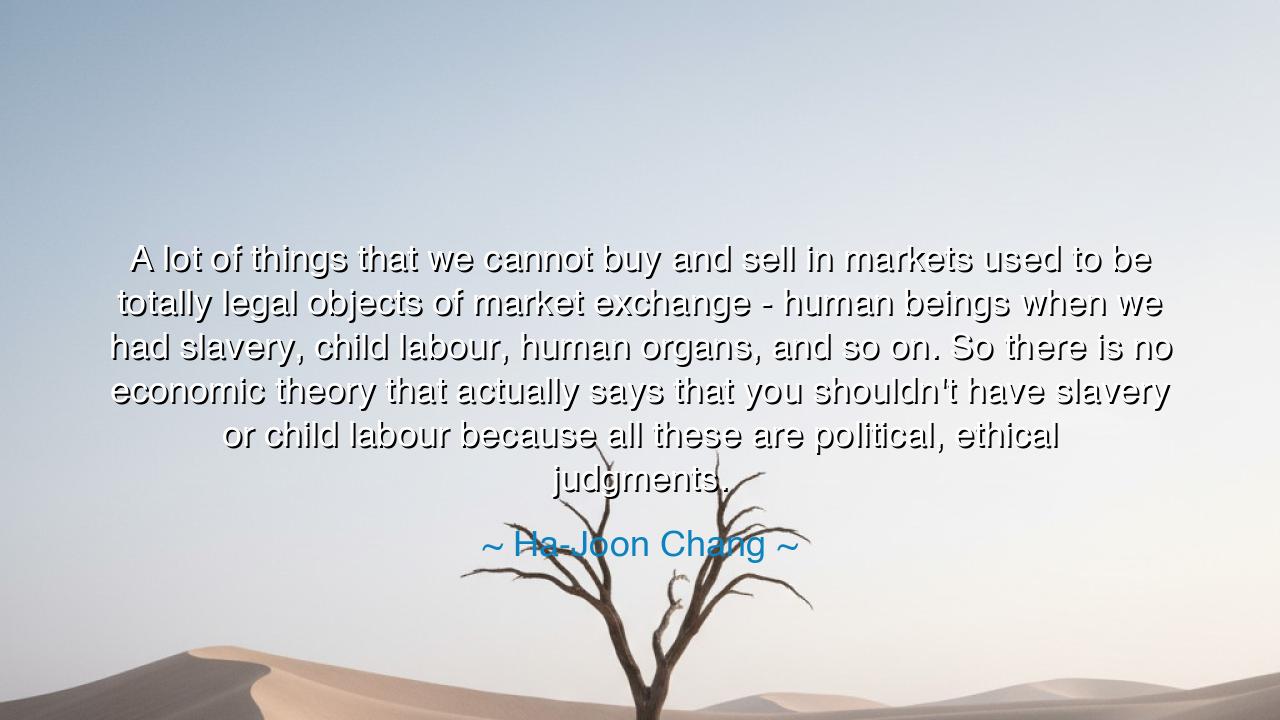
A lot of things that we cannot buy and sell in markets used to be
A lot of things that we cannot buy and sell in markets used to be totally legal objects of market exchange - human beings when we had slavery, child labour, human organs, and so on. So there is no economic theory that actually says that you shouldn't have slavery or child labour because all these are political, ethical judgments.






Hearken, O seekers of wisdom, to the words of Ha-Joon Chang, who pierced the veil of numbers and markets to reveal a truth as old as civilization itself: "A lot of things that we cannot buy and sell in markets used to be totally legal objects of market exchange—human beings when we had slavery, child labour, human organs, and so on. So there is no economic theory that actually says that you shouldn't have slavery or child labour, because all these are political, ethical judgments." In these words lies a meditation upon the limits of commerce, the nature of morality, and the role of law and conscience in shaping the societies we inhabit.
Since the dawn of trade, humanity has wrestled with the question of what is permissible within markets. In ancient Athens and Rome, the commerce of human beings was ordinary, woven into the very fabric of economy and society. Slaves tilled fields, labored in households, and fought in wars, recognized as property by law. Yet even in such times, philosophers like Cicero and Seneca questioned the morality of treating sentient beings as commodities, revealing that the human conscience often glimpses justice even where law does not. Chang’s insight reminds us that commerce alone does not dictate ethics; economic theory cannot adjudicate what is just or unjust.
Consider the example of the abolitionist movement in the 18th and 19th centuries. Across the Atlantic, brave men and women—such as William Wilberforce in England and Frederick Douglass in America—challenged the legality of slavery, not because markets dictated it, but because political and ethical judgments demanded it. The market exchange of human beings was once lawful, profitable, and normalized; yet morality, courage, and political action overrode economic convenience, demonstrating the primacy of conscience over commerce.
Chang’s reflection further illuminates the historical use of child labour, common in industrializing nations. In Victorian England, children toiled in factories and mines, considered essential to the market, yet grievously exploited. It was not economic theory that ended this practice, but reformers, activists, and lawmakers who acted upon ethical judgments, recognizing the dignity, safety, and potential of children. This shows that legality and market acceptance do not equate to moral legitimacy, and that society must sometimes resist the logic of profit in favor of justice.
The lesson extends even to contemporary debates over commodification. Discussions of human organs, surrogacy, and other ethically charged markets reveal that not all that is possible or profitable is right. Chang reminds us that markets are tools, not arbiters of morality. The buying and selling of goods may follow supply and demand, yet the question of whether we should commodify life, labor, or health remains the realm of law, ethics, and civic responsibility. History has repeatedly shown that unbridled market exchange without conscience invites suffering and injustice.
From this reflection emerges a timeless truth: the human heart and mind are the ultimate judges of justice. Political and ethical judgments guide the proper use of markets, law, and institutions. As citizens, scholars, and stewards of society, we bear the responsibility to evaluate what is lawful, what is profitable, and what is right. Chang’s insight reminds us that morality cannot be delegated to markets alone; conscience, courage, and collective action are the instruments by which societies correct their errors and uphold the dignity of all.
O seekers of wisdom, let this teaching guide your life and judgment. Examine the forces of commerce and legality with discernment, questioning not only what is permitted or profitable, but what is just and humane. Stand against practices that exploit, demean, or harm, even when they are legal or economically rational. History teaches that ethical courage transforms societies, preserves human dignity, and elevates civilization beyond mere transactions of wealth.
Take this teaching into your daily actions: weigh the morality of your choices, resist complicity in unjust systems, and recognize that the law and markets are instruments, not absolutes. Whether in business, governance, or personal conduct, allow political and ethical judgment to guide you. In doing so, you honor the lessons of the past, safeguard the rights and dignity of the vulnerable, and ensure that the power of commerce serves humanity rather than diminishes it. Ha-Joon Chang’s words are a beacon, reminding us that justice and conscience must always temper profit and legality.






AAdministratorAdministrator
Welcome, honored guests. Please leave a comment, we will respond soon